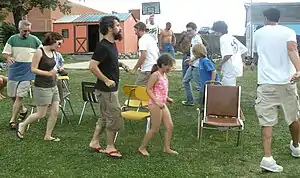Musical chairs
Musical chairs, also known as Trip to Jerusalem, is a game of elimination involving players, chairs, and music. It is a staple of many parties worldwide.
 Musical chairs being played at a party | |
| Players | Variable |
|---|---|
| Setup time | Variable |
| Playing time | Variable |
| Random chance | Music stoppage may seem random to players, but is under the control of the leader |
| Age range | Usually children |
| Skill(s) required | Quick reaction time |
Gameplay
A set of chairs is arranged with one fewer chair than the number of players (for example, seven players would use six chairs). While music plays, the contestants walk around the set of chairs. When the music stops abruptly, all players must find their own individual chair to occupy. The player who fails to sit on a chair is eliminated.[1] A chair is then removed for the next round, and the process repeats until only one player remains and is declared the winner.
History of the name
The origins of the game's name, Trip to Jerusalem, is disputed. However, it is known to come from its German name Reise Nach Jerusalem ("The Journey to Jerusalem"). One theory suggests that the name was inspired by the Crusades, wherein several heavy losses were incurred. Another theory suggests that it was inspired by the Aliyah, the immigration of Jews from the diaspora to the Land of Israel (which includes the modern State of Israel), wherein it is stated that spaces on ships taking the Jews to the said land were limited. None of these theories were officially confirmed.
As metaphor
The term "playing musical chairs" is also a metaphor for describing any activity where items or people are repeatedly and usually pointlessly shuffled among various locations or positions. It can also refer to a condition where people have to expend time searching for a resource, such as having to travel from one gasoline station to another when there is a shortage. It may also refer to political situations where one leader replaces another, only to be rapidly replaced due to the instability of the governing system (see cabinet shuffle).
In popular culture
In the musical Evita, during the song "The Art of the Possible", Juan Perón and a group of other military officers play a game of musical chairs which Perón wins, symbolizing his rise to power.
References
| Wikimedia Commons has media related to Musical chairs. |
- Orlick, Terry (2006). "No-Elimination Games". Cooperative Games and Sports: Joyful Activities for Everyone. Human Kinetics. p. 21. ISBN 9780736057974.